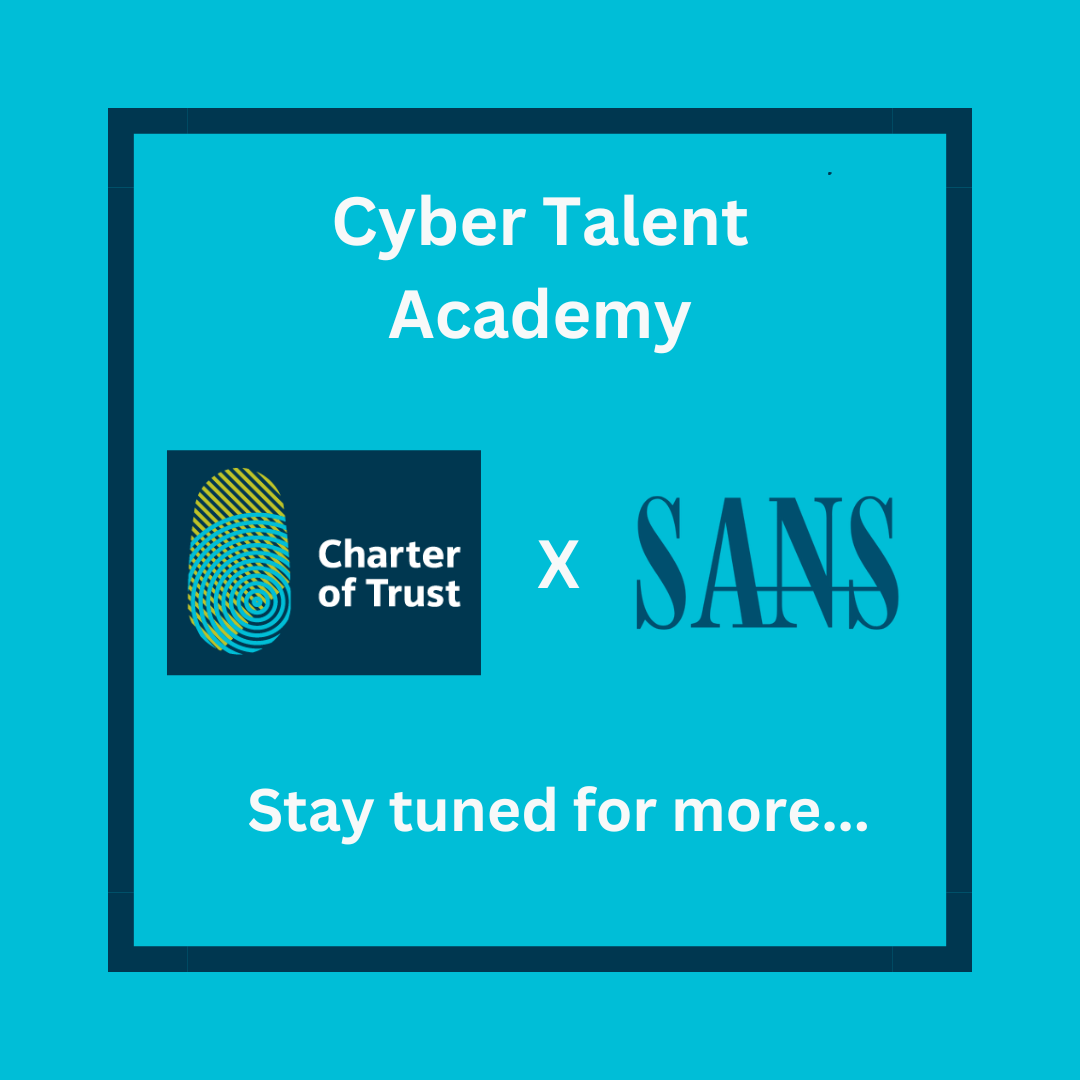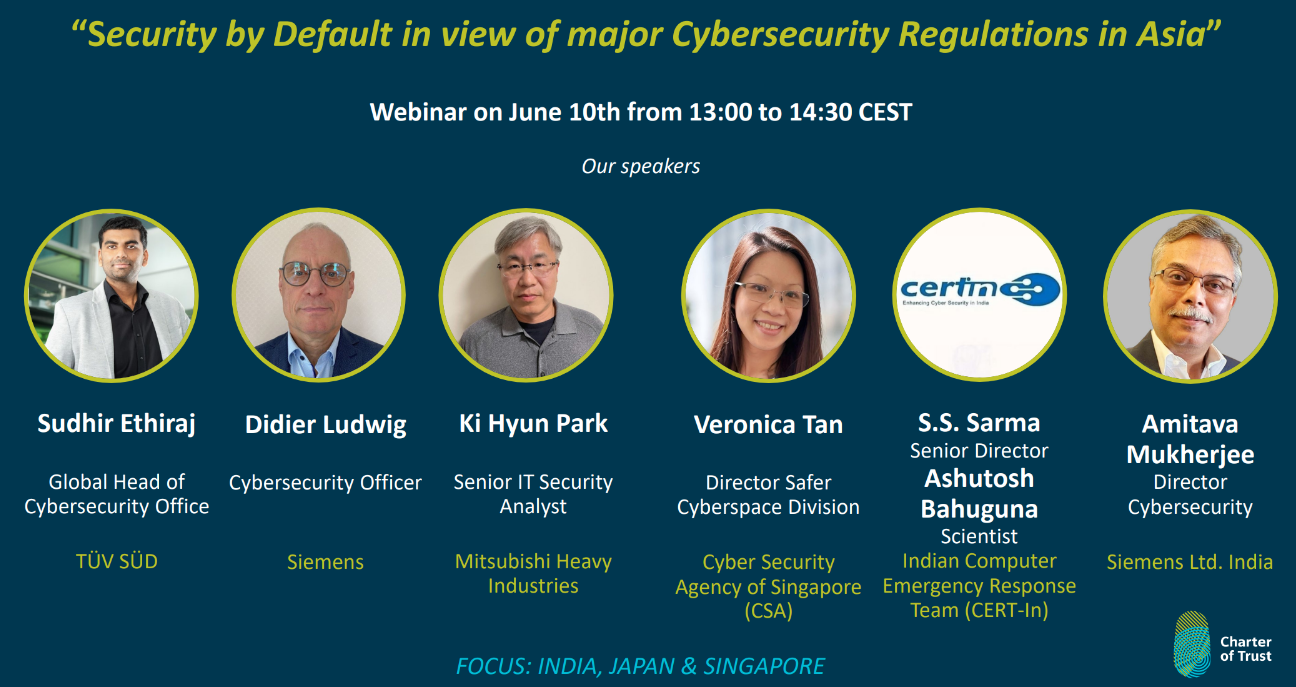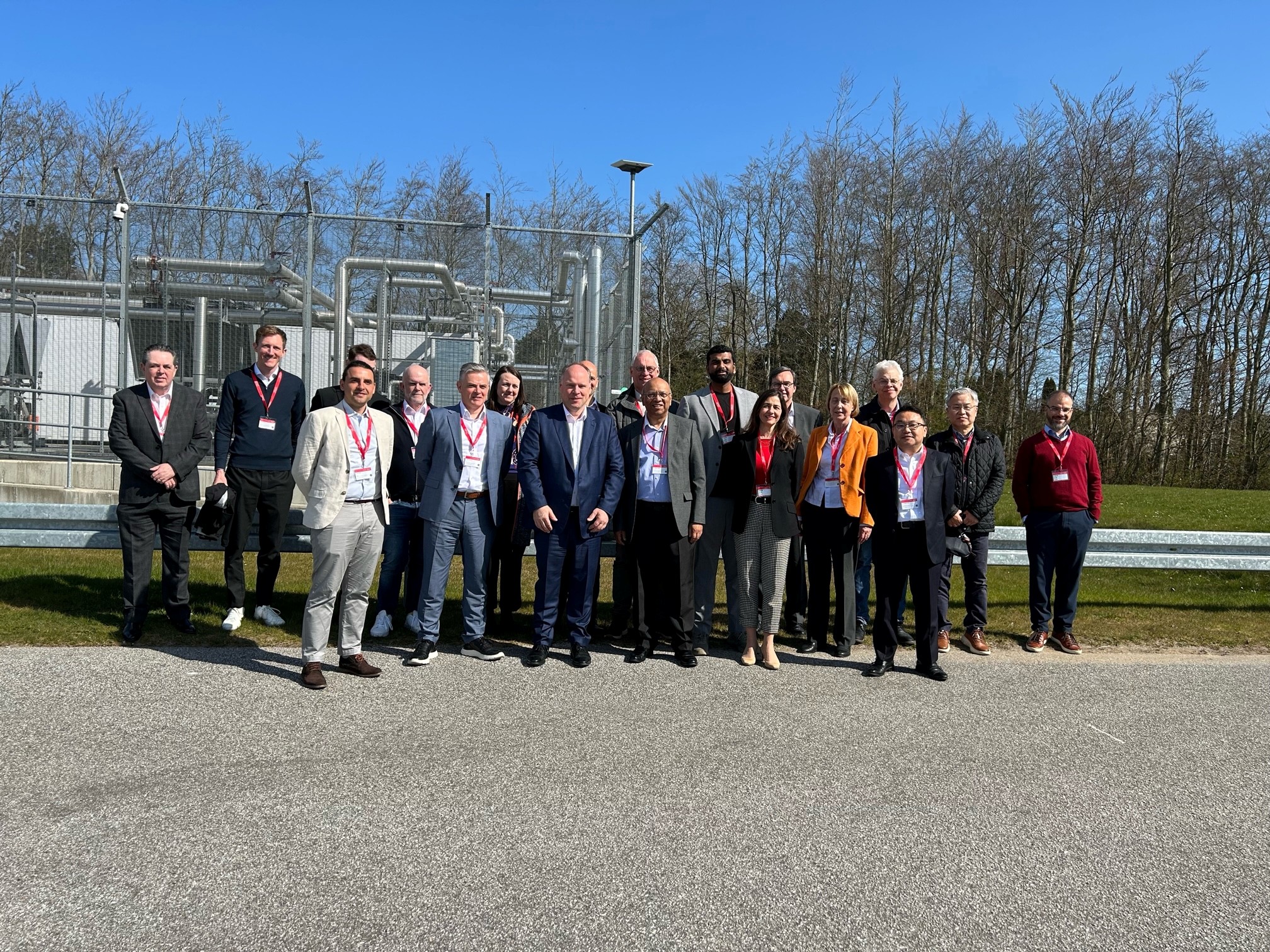On 29 October, the Charter of Trust Principle 8 ‘Transparency and Response’ hosted its first-ever webinar on the cybersecurity threat landscape with leading experts in the field. The session started with an overview of the 2020 threat landscape, examined how the Charter of Trust is sharing threat information among its members through its Human-to-Human network and by building a threat information sharing community supported by a leading platform.
The session was introduced by Jonathan Sage, Government and Regulatory Affairs Executive at IBM and Principle 8 Taskforce Lead. Launched in 2018, the Charter of Trust aims to drive security in an insecure, connected world and all of its members collaborate to implement the Charter’s 10 Principles. The Principle 8 Taskforce ‘Transparency and Response’ aims to achieve the following objectives:
- Establish appropriate corporate policies that allow threat information sharing for individuals within the CoT;
- Establish a strategic and operational threat information response forum within the CoT;
- Leverage an existing platform that allows threat information sharing, therefore augmenting awareness and enabling scaling to supply chain.
Kevin Albano, Associate Partner at IBM Security X-Force Threat Intelligence, presented the current threat landscape amid the COVID-19 pandemic. The global proliferation of ransomware puts companies worldwide at higher risk as they are facing “Human-Operated” Ransomware-as-a-Service operations. Following the payment of a ransom, threat actors are further motivated to increase both the number of attacks and the price of the ransom itself.
This was followed by an industry panel discussion moderated by Jonathan Sage:
- Holger Steinlechner, Senior Security Specialist at Allianz, provided insight on the provenance and challenges of threat information sharing. Companies share indicators of compromise, knowledge and insights into incidents to improve their defenses against attackers. Among the prerequisites, trust is an essential component of threat information sharing.
- Regarding the Internet of Things (IoT), Hans de Jong, Senior System Architect and Fellow at NXP, highlighted that the hardware and the firmware cannot be updated easily or at all. Therefore, incidents must be shared with trusted entities who are affected or have to take action.
- Karl Alles, Group Security Officer at Atos, noted that the increasing complexity of the supply chain and very well-organized adversaries require a timely availability of threat information. Within the Principle 8 Taskforce, members exchange regularly as part of the Human-to-Human Network using the Information Sharing Traffic Light Protocol (ISTLP) adapted for the CoT.
Choo Kim-Isgitt, Chief Revenue Officer at TruSTAR, presented the TI sharing platform used within the Human-to-Human Network, which features enclaves to manage various sources with cloud-based data repositories. As illustrated by the City of Los Angeles CyberLab, private enclaves are also made available for each member.
The audience. which was comprised of governmental and industry stakeholders from around the world as well as fellow CoT representatives, was invited to share their thoughts and questions with our panelists throughout the discussions and during our Q&A session.
To hear the full discussion between our experts, make sure to check-out the recorded webinar above and stay tuned for more Charter of Trust webinars coming soon!


You may also like

Cyber Talent Academy Workshop: Shaping the Future of Cybersecurity Talent
Bringing together representatives from Charter of Trust Partners and external organizations, the session focused on enhancing the Cyber Talent Academy, a growing initiative that is already demonstrating real impact. The workshop was a space for deep exchange, shared purpose, and forward-looking collaboration between cybersecurity and HR professionals.
One key theme ran through every conversation: the cyber skills gap continues to widen, and traditional recruitment methods are no longer enough. To meet growing demand, we must fundamentally rethink how we discover, train, and support talent.
A New Approach to Cyber Talent
The Cyber Talent Academy is emerging as a powerful model for change. By offering alternative pathways into cybersecurity, beyond conventional educational and career tracks, it opens opportunities to individuals from a range of academic, cultural, and professional backgrounds. Participants agreed that the programme holds strong potential for expanding the talent pipeline, increasing diversity, and making cybersecurity more inclusive and resilient.
The workshop discussions underlined several critical insights:
- Relying solely on established recruitment channels will not close the cyber talent gap.
- Tapping into overlooked talent pools, through inclusive outreach, training, and mentoring, creates real business value and aligns with corporate social responsibility goals.
- Stronger collaboration between cybersecurity and HR teams is essential, particularly when it comes to structuring mentorship, supporting life-long learning, and designing modern career pathways.
- Initiatives like the Cyber Talent Academy are already showing higher retention and greater team innovation in participating organizations.
“Attracting, retaining, and developing cybersecurity talent is a challenge faced by nearly every organization today,” says Dr. Sumit Chanda, Co-Chair of the Charter of Trust and COO Group Security & Business Lines CISO at Atos. “The Charter of Trust Cyber Talent Academy offers a bold and innovative response to this challenge.” Dr. Chanda further emphasizes the power of collaboration, between businesses, educators, and governments, as essential to closing the cyber skills gap. He adds, “Expanding access to cybersecurity training, especially for underrepresented communities, isn’t just the right thing to do, it’s smart business. Diverse perspectives are vital to building resilient and secure systems.”
Looking Ahead
This workshop was just the beginning. The energy, expertise, and ideas shared on June 5th are shaping the next phase of the Cyber Talent Academy, and informing how we support our partners in building stronger, more inclusive cybersecurity teams. We’re excited to continue this journey and will be sharing updates on upcoming developments.
Stay tuned. The future of cybersecurity talent is collaborative, diverse, and full of potential.

Webinar: "Security by Default in view of major Cybersecurity Regulations in Asia"
We extend our heartfelt thanks to our distinguished panellists: Veronica Tan from the Cyber Security Agency of Singapore, S.S. Sarma and Ashutosh Bahuguna from CERT-In, Amitava Mukherjee and Didier Ludwig from Siemens, and Ki Hyun Park from Mitsubishi Heavy Industries.
Their insightful contributions covered the development and implementation of various cybersecurity regulations in Asia, sparking a truly engaging and interactive session. With roughly 80 participants, primarily from Asia, the discussion was enriched by thought-provoking questions from the audience, underscoring the urgent need for such dialogues.
The discussion covered a wide array of crucial topics. The panellists explored various regulatory frameworks that govern critical infrastructure in different Asian countries, examining the importance of establishing baseline requirements and adopting a risk-based approach across various industries to enhance cyber resilience.
A consensus emerged that security by default must be ingrained in the culture, while considering the essential role of regional context for effective implementation.
Thank you to everyone who participated! A recording of the webinar can be found at the bottom of this page.

Collaboration Week 2025 in Denmark
Charter of Trust partners unite in Denmark for a three-day deep dive into cybersecurity collaboration.
Collaboration Week 2025 brought together representatives from all Charter of Trust member organizations for an intensive three-day summit hosted in Denmark. This event serves as a cornerstone of our alliance—an opportunity to connect, align, and advance our shared mission of building a safer digital world.
This year’s agenda was designed to elevate our collective efforts in tackling today’s most urgent cybersecurity challenges. From artificial intelligence and emerging technologies to supply chain security, harmonized regulations, security-by-default practices, and future-focused education and advocacy, the sessions sparked meaningful dialogue and strategic alignment across working groups.
What emerged from these discussions was a powerful reminder: coordinated, purpose-driven collaboration is essential to building and sustaining digital trust. The impact of our joint efforts continues to grow as we share expertise, synchronize our actions, and lead by example.
A heartfelt thank you to Danfoss for hosting this year's event and offering an inspiring behind-the-scenes tour of their data centre. Their hospitality and commitment to innovation set the perfect tone for our discussions.



